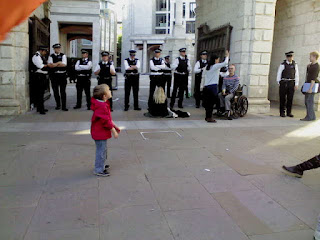TV promises great things in 2012. These are some highlights that might be worth watching out for....
January - Guess Who's Coming to Dinner? - ITV
Reality TV show about some charity workers working with starving Africans. Tensions rise as the crew struggle to get aid in on time, and run into conflict with the local politicians. But politics is a problem on the camp too, as Daryl and Victoria can't decide who should run things. Elsewhere, there's a sparkle of romance for Jenny and a local boy.
February - Panorama: Jurassic Pork - BBC1
Examining the link between developments in the swine flu (H1N1) virus and pigs in blankets leftover at Christmas.
March - Jeremy Clarkson's How About That? - BBC1
More tomfoolery from our favourite blokey bloke as he visits council estates to ask them what they spend their (more like our!) money on.
April onwards- Face Swap - Channel 4
Reality show in which couples see what it's like to have someone else's face surgically transplanted onto the one they love. The first episode sees Jill come home to find that husband Tony now looks like the local newsagent.
April - The Only Made in Swindon - E4
Following the success of the Essex and Chelsea shows, Swindon bands together to prove to the world that they too have dislikable people in their town.
May - Guess Who's Escaped Poverty? - ITV
Follow up documentary about one African family that journeyed across the Mediterranean to Italy, narrowly missing the border police, only to win the Euromillions jackpot on their first attempt. With dramatised re-enactments.
May onwards - Freeloader in an Off-Roader - BBC1
A spin-off of Top Gear's Star in a Reasonably Priced Car in which people on benefits tackle the newly opened Top Gear mud ring.
June - Dry Planet - BBC1
Attenborough does deserts.
July/August - Olympic Shames - BBC1
New cop show following police and security personnel as they rustle up unsavoury characters at London's Olympics. With terrorists, athlete druggies and the communities of East London, the takings are sure to be high.
August - Newsnight: The Riots, One Year On - BBC2
Theresa May and Diane Abbott argue about whether punitive measures were the right tactic to curtail the rise of the underclass, as the cuts began to bite and more riots threatened.
August onwards - BBC R1OT - New Channel
The BBC invents a special channel alongside the News channel for BBC R1OT, a temporary channel, presumably, as the country once again finds itself gripped by riot fever. Join Jon Sopel for 24 hour coverage on the front line in London, and other reporters dotted around the country in dozens of besieged cities.
September - Natural World - BBC2
With incredible new technology BBC camera-people are on location documenting the rapid spread of mould over an opened yoghurt. Micro-Cameratic Technology (MCT) shows in never-before-seen detail some of the most fundamental procedures of life.
September - Jeremy Clarkson's Mao About That? - BBC1
Clarkson gets special permission to drive to China and explore the pros and cons of a communist, capitalist state.
October - An Arm and a Clegg - Channel 4
Looking back at the first half of Nick Clegg's role as deputy Prime Minister, with leading analysts and commentators addressing the gulf between promises and policies.
October - Occupy This! - Channel 4
One year since tents were pitched outside Saint Paul's, Will Self takes a wry look at where all the camping and shouting has got us. With surveys suggesting that the country hates bankers but hates hippies even more, what chance has the newly established Occupy Party got in the next local elections?
October - Euro: A Tough Act to Follow - BBC4
With the drama finally over, and the countries on the continent resuming their former currencies, Paul Mason asks what's next for the once powerful economic force that is Europe.
November - Maya 2012 - Sky1
Three-part drama series spinning-off from The Mummy franchise following Brendan Fraser as he's accosted by Mayans back from the dead with a stark warning for the fate of humanity. Guest stars Sam Neill.
December - What Will You Do Before We Die? - Channel 4
Audience interactive special presented by Jimmy Carr and Davina McCall charting the nations favourite dying wishes. From massive orgies to a ride in a BMW Q60, nothing is unreasonable when the end is nigh. Contribute online or phone in. 10% of proceeds go to charity.
December 20 - Countdown to Doomsday - BBC1
With David Dimbleby.
(Similar program showing on Sky with Adam Boulton and ITV with Alastair Stewart)




















